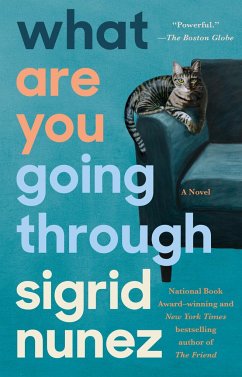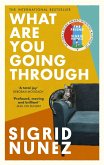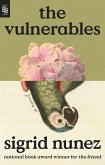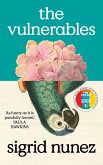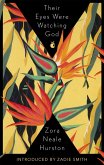The unnamed narrator is visiting a friend with terminal cancer who is in hospital in another town. She stays with a retired librarian with a cat but her host is quite reclusive and they hardly have any contact during her stay. Between the visits, she ponders about other people in her life: her
former partner of whom she attends a public speech on the dystopian future we are facing, her old…mehrThe unnamed narrator is visiting a friend with terminal cancer who is in hospital in another town. She stays with a retired librarian with a cat but her host is quite reclusive and they hardly have any contact during her stay. Between the visits, she ponders about other people in her life: her former partner of whom she attends a public speech on the dystopian future we are facing, her old neighbour who can hardly manage alone, a woman she met in her gym who went through drastic changes, each of them starting point for another in-depth reflection. Her encounters reflect the whole range of people and therefore also introduce pestering issues of our time: the way women are judged and how their position in society and in a family is seen, how we treat the elderly and – the most important aspect – how do we want to die and what will remain of us. Quite unexpectedly, her poorly friend asks her a favour which will target core questions the narrator cannot easily answer for herself.
Just as in her former novel “The Friend”, it is a minor event – then an abandoned dog, here a visit to the hospital – which initiates an interesting journey into the depth of human nature. The narrator’s experiences and encounters are analysed and questioned, it is an introspection which nevertheless is far from very individual and personal but, quite on the contrary, concerns everybody. Especially being close to a dying friend has a huge impact on her thinking, far beyond the question if we should rather ask “What are you going through” instead of “How are you”.
The core issue revolves around suffering and pain and the question how much a human being can endure. How do you go on living in a world which does not seem to have a future, at least not an interesting or desiring one. The plot is minimal, at times rather feels like a collection of anecdotes, but looking at it as a whole, you get an idea of the protagonist who is sad, to a certain extent disillusioned, but not grim. She is still capable of attachment and fondness, even though she knows that it won’t last this time. Every single word becomes meaningful and should be use with care therefore.
Repeatedly, Nunez also has her narrator share her reading experiences with the reader and thus transgresses the boundaries of genres once more. She certainly pushes the limits in many respects and engages the reader in thinking. One of the most interesting questions for me was the one rotating around the problem of what can be reported and by whom the act of narration should be carried out, especially when it comes to experiences of general interest. The narrator questions if there is even a language capable of conveying experiences adequately or if, in the end, all language must fail to authentically depict what somebody underwent.
Nunez’ language surely is plentiful enough to engage you in an interesting inner – and hopefully also outer - dialogue.

